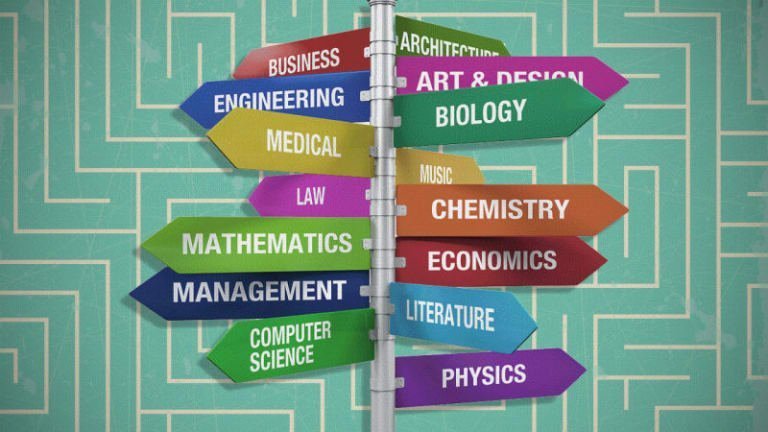
As a high school student, you’ve likely been planning your transition to college since the first day of your freshman year. The closer you get to taking this huge step in your life, the harder it gets to decide what to do next.
It’s important to consider your strengths, weaknesses, and interests. Which subjects do you do well in? Are there particular topics that draw your interest over others? Are there classes in which you stare at the clock more than your books?
By taking the time to reminisce over previous classes and figure out your interests, you are taking the first step on the path to your major.
How to Choose Major in High School and Save Money
Why would you choose a major in high school?
There are a number of benefits when you choose your major in high school.
1. Shortlisting colleges gets easier
When you have no pre-decided major, your primary criteria for picking a college would generally be a good reputation, the location, and lower tuition.
If you were to follow this approach, you would later have to pick a major out of the limited list of majors that the college provides.
In addition, if the major that you really want is not provided by the college, you’ll have to go through the hassle of transferring to a new school.
There are about 5,300 colleges and universities in the United States, and shortlisting from that huge of a list isn’t going to be an easy task.
If you know what major you want to pursue in advance, you can filter out most of the colleges that do not offer what you are looking for.
Once you have a short list of colleges that do offer your preferred major, you can then trim it down further by picking ones that have a good reputation, location, and affordable tuition.
2. Save money by taking AP classes in high school
In most high schools, Advanced Placement (AP) classes are made available to the student body. These are college-level classes that students can take free of charge and are a great investment in your future.
Aside from a few subjects, a score between 3 and 5, 5 being the highest, will usually get you full college credit for taking the class. In other words, every AP test that you pass is a class you do not have to later pay for in college.
Not only do you save serious money by taking AP classes early on, but you also show colleges that you’re taking on the toughest courses available to you. This can work in your favor and boost your college application.
I took a total of nine AP classes in high school, ranging from AP Psych to Comparative Government, and all of them got added to my college credit and cut out a significant amount of credits that I needed to graduate.
If you know the major or career field you are interested in, choose the AP courses that best fit that field.
3. Minors and Double Majors
If you’re a student with a high intellectual appetite, you can choose to pursue a double major or complete both a major and a minor.
Double-majoring means that you will be taking on a heavy course-load related to two separate academic concentration.
A minor is similar to a major in the sense that it’s an area of academic concentration. The only difference is that a minor requires relatively fewer classes.
The option to complete a double-major or a minor is only available for students who have enough credits to do so.
In other words, if your college requires 180 credits to graduate, but you only have 25 available, you will not be able to take on an extra major, while you may be able to take on a minor (all dependent on your individual school).
In order to have enough credits, you must have a plan early on; if you use a majority of your credits “testing the waters” and trying out a multitude of classes, you will most likely not have enough left to double-major or complete a minor.
Completing extra majors and minors reflects extremely positively on your character in the career world, as you are able to demonstrate your ability to think ahead, your capability of handling heavy workloads, and your vast array of knowledge.
How to choose a major in high school?
While it can be hard to know what your major will be right from the start, figuring it out early definitely pays off in the long run.
If you do not have one single interest or passion in life and are struggling to pick a major, there are a few things you can do to help you discover your path, while minimizing wasted time and money.
Step 1 – Consider Advanced Placement classes that fit your interests
Maybe you already know that you want to be a dentist, software engineer, nurse or an astronomer.
For those who don’t have a set career path decided, talk to a general advisor at your school and let them know that you aren’t quite sure of what you want to pursue. Maybe you have multiple interests, or maybe you have none. That’s okay!
Instead of taking a multitude of AP classes in randomly picked subjects, try to narrow your “discovery” classes to ones that easily fit into the majority of subjects. Your advisor should be able to tell you which classes these would be (they are usually considered general education credits or prerequisites).
However, if you’re sure of your career path, take classes that fit the related major. Make sure you’re ready for the coursework required for the career of your dreams.
Step 2 – Weed out fields you don’t want to pursue
Next, after having taken a few of these classes, it is time to self-reflect.
Which classes did you really enjoy? Were you truly interested in the content or were you suffering through every second watching the clock? Was there a certain reading you did or project you completed that filled you with questions or the need to know more?
Both the good and bad classes that you take your first couple of quarters/semesters give you valuable insight into who you are and what your career interests might be.
While you may feel like that class you hated was a waste of time, it was completely the opposite! Now you know which subject you definitely do not want to pursue, and that’s a step closer to finding your passion.
Step 3 – Research majors based on shortlisted interests
After gaining this little bit of insight in regards to your interests, pull up a few college websites and take a look at all the majors that these schools have to offer. This is how I personally discovered my future majors of Sociology and Communications.
Take some time to go through the list and write down or open a new tab for every major that sounds even slightly interesting. After you have your list, go through it slowly, reading the descriptions of all majors and looking up majors that you may have not even heard of before.
With this list, you should be able to narrow your options down to just a few majors. It’s okay to have more than one, as these are going to be your guide.
Step 4 – Career Paths and earning potential
Lastly, you’ll want to find out all the potential career paths for each of the finalized majors.
To get this information, your best bet is to meet with your college advisor. Just make an advising appointment with each specific department that you’ve listed down.
Although you can find this information online too, I would strongly recommend meeting with somebody who knows the type of jobs offered to their past students.
Once you know the career paths, you can easily find their median salary on the internet.
Finding a career with a high salary is not enough. Research future job growth prospects associated with a particular career. For example, as data becomes a super important part of the economy, skills related to data science and analysis are extremely valuable.
College is a big investment, and you’ll likely have to take on a student loan at an early stage in your life. It is imperative to consider future growth and earning potential when choosing your major.
Stay ahead in your financial journey by taking advantage of our most recommended tools and resources
A Final Note
When you’re not 100% sure of what career path to take, you could easily end up spending thousands of dollars on subjects in college that won’t provide you any real value.
Personally, I am the kind of person who switched back and forth between paths, struggling to stick with one “dream” career throughout my life.
Taking a few subjects early on in high school made me certain of the ones that I truly enjoyed studying. This led me to find my major of interest, and in turn, my “dream” career.
In doing so, I saved a lot of money by not taking random “exploratory” courses in college.
More importantly, If you love what you’re studying, you’re more likely to fully engage with your classes and college experience, and that can mean better grades and greater relationships with others in your field later on in life.
- Next Read – How to Lower College Tuition [11 Clever Ways]




